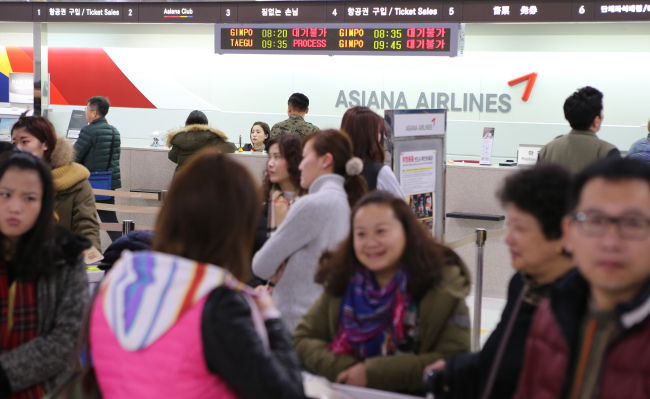South Korea’s budget airlines have submitted a petition against Asiana Airlines’ move to establish its second low-cost carrier this year, according to the Ministry of Land, Infrastructure and Transport on Sunday.
The heads of three budget air carriers ― Jeju Air, Eastar Air and T’Way Air ― handed in the petition last week to protest the country’s second biggest commercial carrier’s move to launch a new Incheon-based budget airline.
“(The government) should not give a permission to the new air transportation business operator as it is expected to weaken the domestic air carriers’ competitiveness,” the budget carriers’ CEOs said in the joint petition.
 |
| Passengers wait at the domestic check-in desk of Asiana Airlines at Jeju International Airport. (Yonhap) |
Asiana Airlines gave a fresh impetus to its plan to launch its second budget airlines, tentatively named “Seoul Air,” after making money with its existing low-cost carrier unit, Air Busan, amid the LCC industry’s rapid growth buoyed by the increasing number of Chinese tourists.
The LCC industry leaders said that Korea’s large domestic airliners monopolized the traffic rights for international routes, and foreign budget air carriers’ aggressive move to enter Korean market resulted in cutthroat competition and worsened the profitability of local budget carriers.
Of the five local low-cost carriers currently operating here, two ― Jin Air and Air Busan ― are subsidiaries of the country’s largest airline Korean Air and No. 2 Asiana Airlines, respectively.
“The approval will only protect the interests of large commercial airliners rather than expanding options for consumers,” they said.
On March 1, Asiana promoted Ryu Kwang-hee, senior managing director and head of Asiana Airlines’ passenger division, to Seoul Air’s chief executive officer, and formed a task force with the aim to establish Seoul Air by the first half of 2015.
But it has not yet applied for a license to operate the LCC.
Asiana Airlines’ spokesman Cho Young-suk said, “While there are worries that a new carrier may eat into the existing market, the combined size of the industry will grow eventually.”
He added that it was a global trend for full-service carriers like Singapore Airline and All Nippon Airways to have a low-cost affiliate carrier.
By Park Han-na (hnpark@heraldcorp.com)

